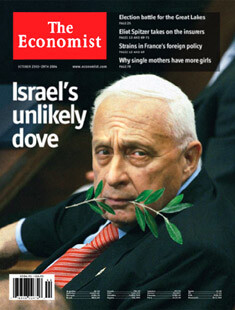The Electronic Intifada 1 November 2004

Cover of The Economist, October 23rd, 2004.
Last week’s cover showing a photo of Ariel Sharon with an olive branch in his mouth—“Israel’s unlikely dove”—had a different resonance. What was mildly amusing for Economist readers who caught the pun on Noah’s Arc mythology and modern day “Holy Land”, was a cheap shot to Palestinians: Israel’s mass destruction of olive groves, on which most Palestinians base their livelihoods, is a frustration tactic that Israel has used to displace the indigenous Arabs for the past 56 years.
Was this a deliberate hack (no pun intended)? One mustn’t judge. But since the Economist’s correspondent dines with Yasser Arafat, as this past issue boasted, one assumes he would know better. Then again, the Economist doesn’t exactly cater to a Palestinian audience.
A Greek investment banker, with whom I had dinner last week, made an interesting point about how the Economist compares to its mainstream competitors. By couching its perspective in the global economy, he said, The Economist avoids the nationalistic fervor that’s typical of Newsweek or Time. Indeed, he added, the Economist means nothing to a goat herder in Greece—or a Palestinian olive farmer—but at least it’s “sentimentally detached”.
Regardless of attachments and interpretations, every newspaper, magazine and talking head needs to establish a standard of reality before it tells a story. For example, one cannot write about voters in Zimbabwe (or Florida) without the topic of political corruption; or about Baghdad as if there were no armed resistance. The successful journalist conveys a clear and unmistakable preface, as if to say, “In this realm, what appears yellow is really orange, and what looks blue is actually green.”
Not surprisingly, the Middle East is often painted in a wild array of ill-defined colors. Legitimate resistance (like Hamas attacks on Israeli soldiers) is labeled “terror”; occupied land is called “disputed territories”; and the illegal, 25-foot wall that steals vast swathes of real estate is called “a security barrier”. Since these fallacies are mainstream trends, most readers are hostage to a limited realm of understanding.
The Economist rarely fails to establish its realm of standards. For cover stories, The Economist introduces this realm in the magazine’s “Leaders” section. In the recent case of the October 23 feature on Sharon’s plan to evacuate Jewish settlers from Gaza, the Leader deserves some attention.
Never shy to editorialize—in fact, people buy the magazine for this reason — The Economist affirmed its editorial position on “Israel’s unlikely dove” in three swift strokes: Sharon is hardly a pacifist; his decision to evacuate is unusual; all skepticisms aside, Israel’s withdrawal from Gaza is a good thing.
To an open-minded, loyal Economist reader (which I once was), this adds up: conflict is bad, and Israel’s occupation of Gaza has produced conflict. No problem. But Economist readers aren’t naïve, so moral rhetoric without empirical evidence — statistics, precedents, quantities — is empty rhetoric. The article fills this gap by reminding us that Sharon’s encroachments in the West Bank, via the “security barrier”, are a violation of international law.
With this simple assertion, The Economist creates a relative standard of reality. It knows its readers will listen to Israelis and Palestinians cry foul all day without taking sides. What they require is a point of reference that is loftier than the sentiments on the ground, and international law, given its prestigious heritage in the Nuremberg Trials, is a decent enough place to begin.
By recognizing international law, The Economist not only establishes an credible realm of reality, it offers its readers an insight that is more progressive than its counterparts at The New York Times, who often choose not to mention “international law” and “Israel” in the same breath. Likewise, The New Yorker has been known to editorially sneer at the concept. Apparently, for these publications, a sentimental portrait of Zionism can’t be bothered with such stuffy things.
Unfortunately, no sooner does The Economist take this noble stab, than it loses confidence in its frame of reference. The first instance comes several sentences later when the article abandons its recognition of international law to recall the 2000 Camp David negotiations: “[Sharon] will certainly not offer the Palestinians the deal (about 95% of the West Bank, a share of Jerusalem and all of Gaza) that his Labour predecessor, Ehud Barak, ended up willing to offer in 2000” (the Economist’s parentheses).
In terms of international law (i.e. UN Resolution 242), Israel was never in the charitable position to “offer” 95% of the West Bank. Instead, Israel was and still is required to surrender 100% of the West Bank, which it illegally occupied in 1967. Add this rather pertinent detail to the above quote, and one has a more critical understanding of the moral predicament that Israel and Sharon are in.
The article’s next paragraph shifts to the all too familiar realm of polarizing the conflict: “Just as millions of Palestinians mistrust Mr. Sharon, …so millions of Israelis believe that Mr. Arafat’s aim is still to throw the Jews into the sea.” The purpose of this sentence, it seems, is to map out the conflict’s parameters. The problem isn’t that this characterization is inaccurate, but that it’s incomplete.
Although Israel and the US have tried to make a Jewish-majority state in Palestine a non-negotiable reality, there still exists a veritable world effort to make the region a single, multi-ethnic democracy — a turnabout not unlike South Africa’s — open to Jews, Muslims and Christians.
This isn’t important to The Economist. “What does matter,” the piece affirms, “is what [Sharon and Arafat] do or can be forced to do while they have power, and whether their actions look likely to make things better or not. Measured by that yard stick, Mr. Sharon’s plan to quit Gaza is a good thing, no matter what his true motives.”
The yardstick that The Economist uses to validate this bold judgment is quantitative: It presents the absurd ratio of the 7,000 Jewish settlers to the 1.4 million Palestinians living in Gaza. The Economist doesn’t mention that the settlers live a privileged existence at the expense of the Palestinians, but the numbers seem compelling enough. The article also infers that “pulling out the settlers and the soldiers should help to reduce the bloodshed.”
All very well, empirical and true. But where was The Economist going with the notion that either side could be justifiably “forced” to do something?
Turning back to international law — that is, in so far as one believes law should be enforced — Israel can be forced, or at least pressured, to evacuate Gaza. Perhaps as a matter of style or variation, the Economist doesn’t invoke that argument. It opts instead to show how unworkable and impractical Sharon’s imprisonment of Gaza would prove to be, and how, “before long, the world would be knocking on [Israel’s] door again, more anxious than ever to resolve a conflict that feeds daily poison into relations between Islam and the West.”
And from the Palestinians, what compromise should be “forced”? The Economist makes a mild overture to the Palestinian’s need to “establish law and order in [the Israeli] army’s wake,” but quickly asks, “why should that prove beyond their means or against their interests?”
Ultimately, the notion of heaping demands on the Palestinians dissolves in The Economist’s own reasoning. So why did they entertain the chauvinistic idea in the first place?
Old habits die hard. The mainstream media might not be ready to abandon its mainstream semantics. For now, let them call an apartheid wall a “security barrier”; allow them to say that Israel seeks a “peace partner” while Israel herself proves again and again, that she never wanted peace.
But no media, even The Economist, is above its audience. It never hurts to remind them when the reader knows better.
Zachary Wales works with the New York Chapter of Al-Awda, the Palestinian Right of Return Coalition. He moved to New York in October 2003 after working in Namibia and South Africa for four years as a media research consultant and news correspondent. He is a regular contributor to EI.




